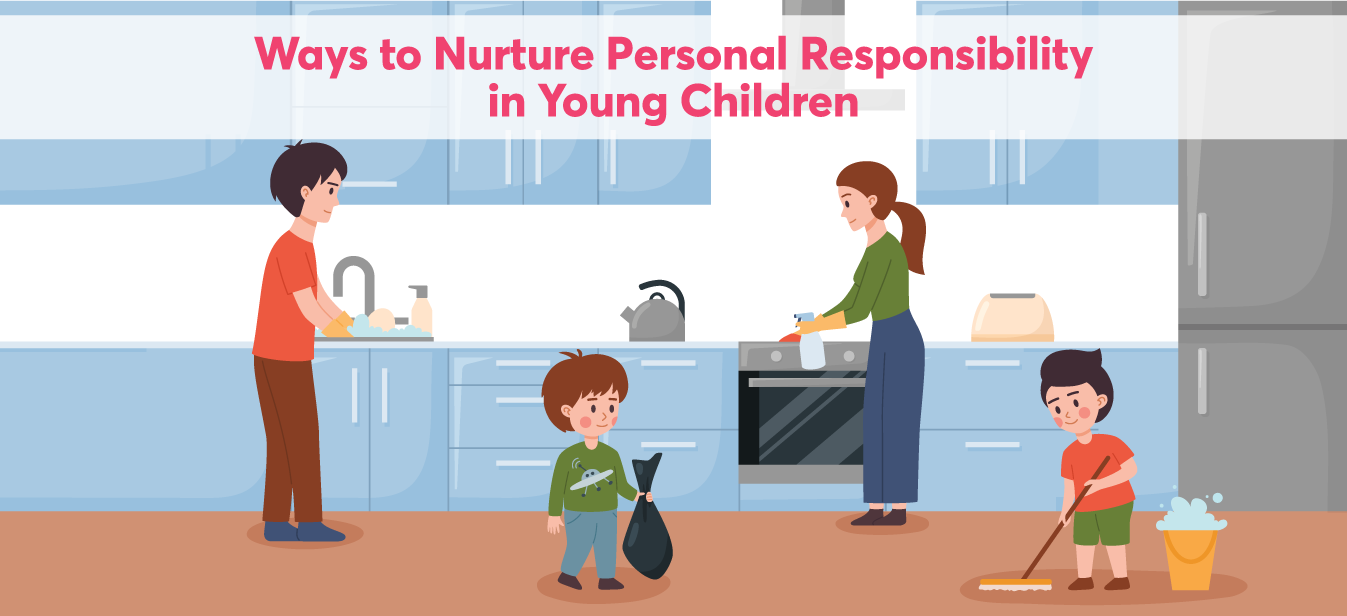Taking on responsibility may sound like a challenge for most young people. However, they may find it thrilling to make a choice or take an action without the input of parents or other adult authority figures. When young adults grow up with no sense of responsibility, they may often have trouble adjusting to society. The problem then grows beyond an individual, and engages an entire community. Thus, instilling personal responsibility in children early on becomes vital.
Personal responsibility is the keystone of all other behaviors.
As a parent, you want your children to grow into responsible adults. But how do you impart responsibility among children? Is it through discipline, or do you coddle and pamper them? In a sense, the answer is both. You must be consistent in your discipline and praise them for good behavior, but also teach them what constitutes acceptable behavior and what does not. When children are young, they are learning to be autonomous beings and making choices that affect their lives. As parents, we have to help them navigate the world and develop their confidence and ability to do so.
If a child doesn’t understand that they are in charge of their own actions, it becomes impossible to teach them a sense of responsibility. At the same time, parents also need to be responsible for their children’s actions. You have to take ownership over what they do to set an example and teach them how to be accountable.
There are many ways to cultivate personal responsibility in our children. Here are just a few:
🖊️ Be a Role Model
Children learn by example, so it is essential to demonstrate the behaviors you want them to adopt. If you want your child to demonstrate a certain set of behaviors, be their guiding light by setting a good example. Children will likely follow suit, so they must see you doing things for yourself without having to ask for help or rely on someone else.
🖊️ Encourage Independence and Self-Reliance
Children need to learn how to make their own choices, act on those, and deal with the consequences of those actions. So they need opportunities to practice making decisions and figuring things out independently — such as solving problems independently or taking care of tasks like getting dressed or packing lunches. Let them try things alone, even if you have to start the task first, so they can see what you’re doing.
🖊️Reinforce Positive Behavior
Give them more opportunities to do activities that require them to be responsible, and let them know how proud you are of their good decision-making. For example, if your child puts toys away after playing with them, praise or give reward for the accomplishment. A pat on the back, a high-five, or encouraging words work just fine. By making sure that they feel good about behaving responsibly and knowing they will be rewarded for it, you can help set the stage for your kids to grow up into responsible adults capable of making sound judgments.
🖊️ Teach Problem-Solving Skills
Help children learn how to identify problems and come up with solutions. Encourage them by praising them when they come up with creative answers — even if they aren’t always successful at solving problems immediately! For instance, if a child says, “I don’t know how to build this”, you could ask, “What do you think would help?” This way, the child learns to come up with ideas and solutions on their own.
If you notice your child has a problem they can’t solve on their own, it’s okay to step in and try finding a solution together. You don’t want to overstep your boundaries and take away from the sense of accomplishment they get from solving problems independently, but there’s nothing wrong with facilitating and encouraging their efforts. Be sure to give lots of positive feedback when they do come up with workable solutions!
🖊️ Teach Them to Say “No”
Kids need to learn to say no to people who ask for favors or gifts they do not want. This is an important social skill that will help them avoid being taken advantage of. It could also teach them to be polite when someone makes an unreasonable request. Teach your child what “no” means, then practice saying it aloud until they get comfortable with it. If you are worried about hurting someone’s feelings, teach them how to say “I would rather not” or “ No, thank you.”
🖊️ Teach Them That There Are Consequences For Bad Behavior
Young children are naturally curious, but don’t always understand the consequences of their actions. As they grow, they need guidance to develop good habits and have an attitude that will help them become responsible adults. Most children know by age five or six that if they hit another kid or break something in a fit of anger, there will be consequences (e.g., time out). But parents need to keep reinforcing this. When kids get in trouble, you have an opportunity to explain what’s wrong with what they did and how to make amends for it. Take the time to talk about mistakes, apologize for your own mistakes, and help your kids devise ways to fix things. If a mistake is relatively minor, try to find a way for them to learn from it without punishing them too harshly. Think of it as building a foundation to build upon when they’re older.
Square Panda encourages holistic development among children with its programs, and engages parents and communities as well in the learning journey. To know more about solutions and interventions, visit ecce.squarepanda.in

